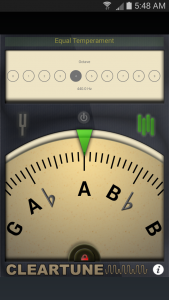*A note about using a tuner with a tone generator to make a test tape:
Make sure your tuner is set to "equal" or "even" temperament.
There are hundreds of different "musical" temperaments that consider "A" to be a value slightly different from 440 Hz (usually a couple of cents sharp. ie.: A4=443.4 Hz).
Anything other than "equal" or "even" is really only useful for tuning acoustic instruments.
So, if you use, say a "Kirnberger" temperament to record a A4 test tone, then try to calibrate the deck to 440 Hz on the tuner, the deck is actually going to run a little slow.
Sorry for the jargon, but I thought this might be good info for anyone using a tuner whose native temperament is anything other than "equal" or "even."
That works too!













